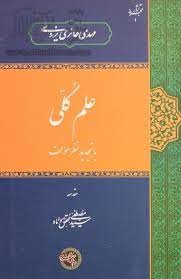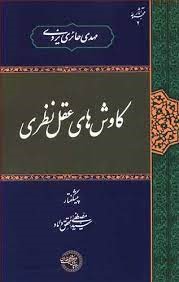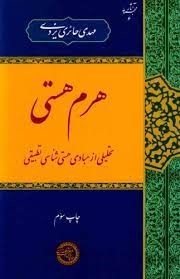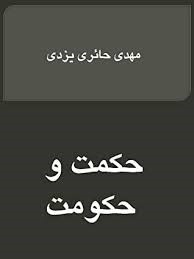Hāʾirī Yazdī, Mahdī
Born in 1923 in the city of Qom as the son of Grand Ayatollah ʿAbdolkarīm Ḥāʾerī Yazdī, the founder of the Theological College in Qom (Ḥouze-ye ʿelmiyye-ye Qom) and one of the highest Shiite authorities of his time, Mahdī Ḥāʾerī Yazdī began his theological studies at the age of 14, showing a special interest in philosophy and conceptual-analytical issues at an early age. Mahdī Ḥāʾirī Yazdī, who – after completing his traditional religious education in Qom – earned a Ph.D. from the University of Toronto in 1979, was exceptional with regard to his first-hand access to western philosophy among Iranian ʿulamāʾ trained in Islamic Philosophy at that time. His writings indeed show a considerable acquaintance with the ‘Western’ texts he deals with. He follows a comparative approach in philosophy which, retaining a schematic dichotomy between Western and Islamic Philosophy however, is dominated by the attempt to demonstrate the superiority of Islamic philosophy, especially in terms of metaphysics and epistemology. Yet within particular discussions of philosophical argumentations, he shows a considerable sense for stimulating critical assessments of Western Philosophers. This includes his evaluation of Kant’s theoretical philosophy.
Works
ʿElm-e kollī. Falsafe-ye mā-baʿdoṭṭabīʿe [*n]
Universal Science. The Philosophy of Metaphysics
This is Ḥāʾerī Yazdī’s first monograph, which appeared as a philosophical textbook at the Faculty of Theology of Tehran University. It is the only one of his works that he wrote before studying Western philosophy, and in which he also does not yet make any references to currents of modern Western philosophy. It is an introduction to the metaphysics of Islamic philosophy as the most fundamental of all sciences from an ṣadrāic perspective, in which a number of central metaphysical concepts (including. existence/voǧūd; mental existence/voǧūd-e ẕehnī; nonbeing/ʿadam; contingency/emkān; unity/vaḥdat; multiplicity/kas̠rat; predication/ḥaml; quiddity/māhiyyat; potentiality/qovvat; actuality/feʿl; cause/ʿellat) is successively dealt with.
Kāvešhā-ye ʿaql-e naẓarī
(Investigations of Theoretical Reason)
This is Ḥāʾerī Yazdī’s first work that is, in part, explicitly comparative: it treats central metaphysical concepts of the Islamic philosophical tradition (cf. ʿElm-e kollī [*]) and their knowability by human reason, and discusses them comparatively with the teachings of Islamic philosophers, especially Mollā Ṣadrās, by critically appropriating the positions of modern and contemporary European thinkers, especially Kant, thereby placing them in a contemporary context of discussion. The work begins with a critical introduction to the state of contemporary Islamic philosophy. In doing so, Ḥāʾerī explicitly understands his writing as a continuation of the tradition of Islamic philosophy, particularly Ibn Sīnās and Mollā Ṣadrās, with the aim of reviving it with a view to contemporary philosophical debates, especially from the field of analytic philosophy. The final chapter, ‘Comparative Theology’ (Ḫodāšenāsī-ye taṭbīqī), is a comparative study of concepts of God and proofs of God in Islamic and Western philosophy [296-369]. Attached to the work is a chapter with detailed definitions of central metaphysical and epistemological terms in Islamic philosophy, which includes numerous citations, albeit without precise source references, of relevant texts by Islamic philosophers (including al-Fārābī, Ibn Sīnā, Sohravardī, Mollā Ṣadrā) [371-423].
The principles of epistemology in Islamic philosophy. Knowledge by presence [*]
Ḥāʾerī Yazdī’s dissertation, written in English, was first published in Tehran by the Cultural Studies and Research Institute (Moʾassase-ye Moṭāleʾāt va Taḥqīqāt-e Farhangī) and was republished by Seyyed Hossein Nasr in 1992. In this work, Ḥāʾerī Yazdī introduces the epistemological doctrine of present knowledge (ʿelm-e hożūrī) first elaborated by Sohravardī and continued by Mollā Ṣadrā in the sense of immediate apprehension of things, which he distinguishes from acquired knowledge (ʿelm-e ḥoṣūlī) in the sense of cognition through conceptualization. Following this, Ḥāʾerī Yazdī compares the epistemological approach of “knowledge by presence” with epistemological discussions by Kant, Russell, and Wittgenstein. In addition, Ḥāʾerī Yazdī reflects on the philosophy of mysticism, meaning here primarily the thought of Ibn ʿArabī, against the background of a critical engagement with Western thinkers, including William James, for example, who have reflected on the phenomenon of mystical experience.
Heram-e hastī. Taḥlīlī az mabādī-ye hastī-šenāsī-ye taṭbīqī
[The Pyramid of Being. An Analysis of the Foundations of Comparative Ontology]
In this work Ḥāʾerī Yazdī presents his ontological model of a pyramidal structure of being. In it, he takes up the ṣadrāic concepts of the primacy of being (aṣālat al-wuǧūd) and the equivocality or multi-layeredness of being (taškīk al-wuǧūd), which are based on the idea of emanation, and subsumes them under a new term, that of the “whole of being” or the absoluteness of being (moṭlaq-e voǧūd), as an ontological system. In this way, Ḥāʾerī Yazdī seeks to reconcile the doctrines of the unity of being (waḥdat al-wuǧūd) and that of the multiplicity of being (kaṯrat al-wuǧūd), at the same time setting them apart from Ibn ʿArabī’s monism of being and various ontological positions of Western metaphysicians. This work, based on lectures given in 1980, opened a new approach in the discussion of ontological issues in Iran through its comparative perspective.
Kāvešhā-ye ʿaql-e ʿamalī. Falsafe-ye aḫlāq
[Investigation of practical reason. Moral Philosophy]
In this work Ḥāʾerī Yazdī presented a fundamental study of practical philosophy. Starting from his basic ontological assumptions and concepts, he discusses the connection and different spheres of being (hastī) and ought (bāyestī) and their conceptualization, such as the morally good (ḫeir-e aḫlāqī) and justice (ʿadl, ʿedālat), among others. In this work, Ḥāʾerī Yazdī compares, among others, Aristotle as well as Hegel, Kant, and Hume with moral philosophical teachings of al-Fārābī, Ibn Sīnā, Mollā Ṣadrā, Qoṭbaddīn aš-Šīrāzī, and Naṣīraddīn aṭ-Ṭūsī.
Ḥekmat va ḥokūmat
[Wisdom and Governance]
This is Ḥāʾerī Yazdī’s contribution to political philosophy; the writing remains as popular as it is controversial in Iran today. Due to its critical stance on the state doctrine of the leader authority of the jurist (velāyat-e faqīh), it was not approved for printing in Iran at the time and was published in London in 1995. In it, Ḥāʾerī Yazdī discusses forms of religiously as well as morally legitimate rule and, on the basis of his ontological conceptual system, outlines a philosophical model of the state as “individual common property” (mālekiyat-e šaḫsī-ye mošāʿ).
Metāfīzīk. Maǧmūʿe-ye maqālāt-e falsafī-manṭeqī
[Metaphysics. Philosophical-Logical Essays]
This is a collection of essays and lectures in which Ḥāʾerī Yazdī deals primarily with some topics and concepts from the fields of metaphysics and logic in the context of the Islamic philosophical tradition. This includes survey-like introductions to Ḥāʾerī Yazdī’s interpretations of the concept of metaphysics [1-22], a discussion of the relationship between existence and quiddity in Ibn Sīnā [101-145], his concept of an ontology based on the principle of unity and his proof-of-God thinking [23-36. 37-47. 48-73], it also includes a critical discussion of Kant’s concept of God [74-100], focusing on both his critique of theoretical proofs of God in the Critique of Pure Reason [75-89] and his concept of God as an idea of reason in the context of his practical philosophy [89-100]. The volume also contains a critique of ʿAllāme Ṭabāṭabāʾī’s concept of contingency (emkān) [147-156], as well as a reply Ṭabāṭabāʾīs response to Ḥāʾerī’s critique [157-163].
(taken from Ueberweg. Philosophie in der islamischen Welt Bd. IV, original German Version Roman Seidel, english translation Roman Seidel)
Teachings
A critique of Kant’s Critique of the ontological argument
A significant example for this discourse is Mahdī Ḥāʾirī Yazdī’s discussion of the argument for God’s existence. In the following discussion, we will not focus primarily on Ḥāʾirīs own attempt to provide a valid proof, which – drawing largely on Mullā Ṣadrā – combines an a priori and a posteriori approach. We will concentrate rather on his critique of Kant’s critique of the Ontological Argument. In his refutation of Kant’s critique of the ontological proof, Ḥāʾirī refers to both basic objections of Kant’s critique mentioned above. Beyond that, in his argumentation, he is not merely concerned with exploring rational ways of proving God, but also with re-establishing a broader concept of being, which – following Mullā Ṣadrā – comprises the totality of reality and is hence much broader than Kant’s understanding of existence.
Sources
Roman Seidel und Reza Hajatpour, § 21.4 Mahdī Ḥāʾerī Yazdī, in Ueberweg. Grundriss der Geschichte der Philosophie. Philosophie in der Islamischen Welt Bd. IV (Hg. Anke von Kügelgen), Basel Schwabe 2021.
Rudolph, Ulrich and Seidel, Roman. “The Philosophical Proof for God’s Existence between Europe and the Islamic World: Reflections on an Entangled History of Philosophy and Its Contemporary Relevance” Asiatische Studien – Études Asiatiques, vol. 73, no. 1, 2019, pp. 57-88.
https://doi.org/10.1515/asia-2018-0043







